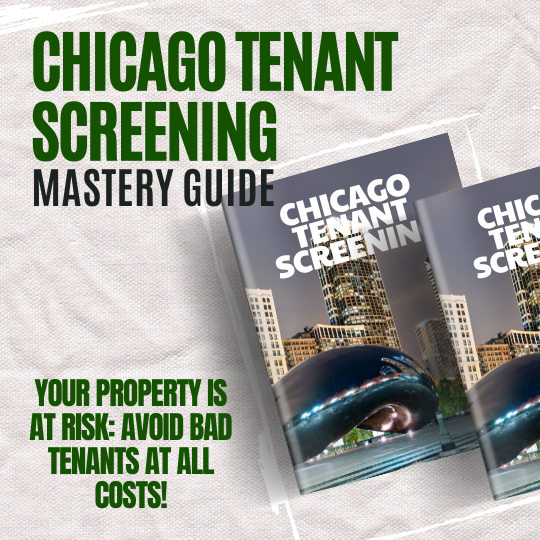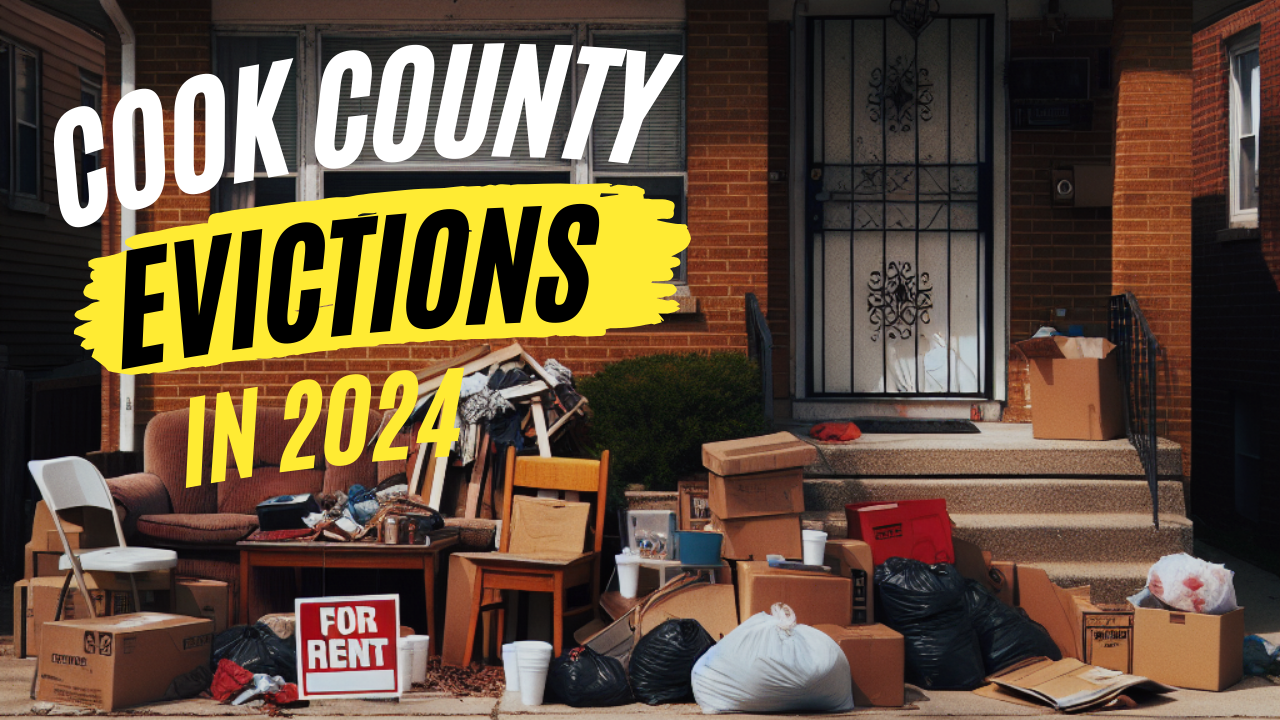
Author: Mark Ainely | Partner GC Realty & Development & Co-Host Straight Up Chicago Investor Podcast
Deciding to move forward with an eviction is difficult, but you pay a lot in time and money too. Most real estate investors know that Cook County and Chicago generally don’t support a landlord-friendly market. The lengthy legal process to remove a non-paying resident from your unit demonstrates that.
Throughout the entire process, as the landlord, you must continue to address any habitability issues in the unit. This can include clogged toilets, heating, hot water, and other services per your lease or per the City of Chicago or Cook County.
In this post-pandemic world, we’ve seen more baked into the process to evict a tenant here. Below we break down everything you don’t know about the Cook County eviction process in 2024.
Step 1: Deliver The Five-Day Notice
Ready to go through with filing for an eviction on a tenant? First you must first serve a five-day notice. At GC Realty & Development, we begin when the tenant is 31 days past due and owes more than $1,000 (not including late fees).
Why not start on Day 6, you ask?
First, turning over real estate is an expensive, long process. If we can save a current tenant by getting their rent current, we make that our first course of action.
We have staff dedicated to working with tenants during the first 30 days to get them back on track. They may get on a payment plan. Or the tenant may just need someone to keep them accountable until they get paid later in the month.
Second, the first step of serving the five-day notice has a lot of time and cost involved. We’d rather exhaust options to get the tenant back on track before investing our time and our client’s money into the process.
Fun Facts about Serving Five-Day Notice in Cook County/Chicago
In Cook County, your five-day notice must have specific language on it. You really need a professional property manager like GC Realty & Development or an attorney to ensure you’ve correctly worded it.
If you serve the tenant an incorrect format of the five-day notice, weeks down the road a judge can throw the case out. Now you have to start over from scratch.
We work with a few law firms that specialize in representing Chicago landlords but we often refer Jessica Ryan from KSN.On the five-day notice, you must document all of the tenants’ names with the correct spellings. Most importantly, you must also include “all unknown occupants” on the same line. This translates later in the process to filing the eviction lawsuit against “tenants’ named and all unknown occupants.”
Why? You’ve covered any other people over the age of 18 who’ve moved in. Otherwise, later in the process, an unknown person can say they live there and never knew about the non-payment issue. This is another reason a judge can throw out your case weeks down the road, forcing you to start over.In Cook County, you must hand deliver the five-day notice to the tenant or someone that lives in the household who is over 13 years of age.
You can use a Special Process Service, but it takes additional time. From the date we submit the five-day notice to them, it takes them 7-10 days to successfully serve the tenant. That service will cost $75–$95.
The amount due on the five-day notice only includes rent. It won’t include late fees, utilities, and any other charges — unless the lease specifically states these other charges are considered "additional rent.”
You can’t just post a five-day notice on a rental unit door unless you know the tenant has abandoned it. In this scenario, the tenant may have left some items in the unit and it looks abandoned. Posting the notice can reduce your risk, but it may only affect any money judgments later in the process.
During The Five-Day Notice Window
Once the Special Process Server successfully delivers the five-day notice, you can still collect the past due rent. But keep in mind, any amount you collect will void the five-day notice you already served.
To file for an eviction, you’d have to serve a new five-day notice with the updated amount. If you accept partial payments, you have to determine if the amount is worth starting the process over again.
Bear in mind the five days are calendar days and not business days. It doesn’t matter if the fifth day lands on a Saturday, Sunday, or a holiday, The five-day notice expires on the sixth day (the next day).
At GC Realty & Development, during these five days we do all we can to try to get a sizable payment. We want to avoid filing for eviction, but usually won’t allow tenants to submit less than half the balance due. And we won’t accept credit card payments or checks for any of these full or partial payments.
Step 2: File For Eviction at the Court House When the Five-Day Notice Expires
If we don’t receive a larger partial payment or payment in full, we move to file for eviction. We’ll send the five-day notice, lease, and tenant ledger to the attorney to file.
We use and recommend that other landlords use an attorney who specializes in evictions. Top eviction attorneys have access to an E-filing portal to file evictions electronically. This way they can file the lawsuit more quickly. If you try doing this yourself, then you must physically go to one of the courthouses.
Step 3: Sheriff Serves Eviction Notice to Tenants
Cook County law says the Cook County Sheriff must make the first attempt to serve the lawsuit notice to tenants. They will attempt to serve the notice one to three times. Typically, around three weeks after the eviction, you’ll know whether the sheriff could successfully serve the notice.
Fun fact: pre-pandemic, the Cook County Sheriff had a success rate around 18%. Post-pandemic, a Sheriff has a success rate around 10% of serving the tenant with the lawsuit.
Step 4: Prepare for the First Court Date
When you file the eviction lawsuit, you will receive the first court date. In suburban Cook County, the first court date is typically 30–45 days from the date of filing. If you file in Chicago proper, expect the first court date around 60 days from the date of filing. For perspective, this is better than the 70–90 days in early 2022 coming out of the pandemic.
This first court date is assigned to the “intake” courtroom for Cook County. This first court date can go one of two different directions, depending on the Cook County Sheriff:
The Cook County Sheriff did not successfully serve the eviction filing.
The first court date becomes a request for another 21 days to hire a Special Process Server to serve the tenant.
The Cook County Sheriff successfully served the eviction filing.
This scenario sounds encouraging, but this scenario can go two different ways, depending whether the tenant appears in court:
a. The tenant shows for the first court date.
The court will grant the tenant a 30-day extension to access to the resources in the Early Resolution Program (ERP).
Created in November 2020 in anticipation of economic impacts from the COVID pandemic, The ERP program allows Cook County tenants to access resources like available rental assistance, a mediator, or other ways to repay balances in full. While set to expire on September 21, 2023, the ERP program may be extended.
b. The tenant doesn't show up for the first court date.
The judge will automatically grant a 14–30 day extension to give the tenant another chance to bring their rent current. (Note: This is a post-pandemic change in the process.)
Step 5: Attend Subsequent Court Dates
Prepare to get to know the security guards at the courthouse before this is all over. You’ll be seeing them a lot for multiple court dates after the first intake hearing.
Second Court Date
In the previous step, when a tenant shows for the first court date, they gain access to ERP resources. At the second court date, they can ask for an extension to continue their attempts to utilize ERP resources. This extension can be up to 30 days.
Third Court Date
Only once the judge feels the tenant has exhausted all ERP resources will they approve assignment to the eviction courtroom. This new court date will be about 30 days later.
Fourth Court Date
At the fourth court date, the case can move to a jury trial. If the tenant doesn’t show up, a judgment can be given to the landlord.
Fifth Court Date (if Necessary)
If the tenant doesn't ask for additional time, the judge doesn't allow it, and no other special circumstances exist, the fifth court date could be the last. BUT it could go further.
If the forth court date goes to a jury trial, the fifth court date will conclude in one of two ways.
Court Ordered Payment Plan
The judge will order residents to make monthly rent on time on the first of the month. They will also order residents to make a payment plan payment on the 15th of the month.
Order of Possession Granted
This sounds good, but still only gets you halfway there. This order by the judge gives the resident typically 7–14 days to leave. If the residents don't leave after the timeframe elapses, the attorney sends the possession order to the sheriff.
Step 6: File Order of Possession with the Cook County Sheriff
Filing the possession order with the Cook County Sheriff places the case on the actual eviction day list. Filing this order with the sheriff will cost $75–$200.
Just Waiting on the Sheriff
Going into 2023, the sheriff’s time frame from receiving the possession order averages 4-6 weeks before the actual eviction day.
The catch: the sheriff only gives the landlord around 12-24 hour notice ahead of the actual eviction. So, when the sheriff calls with a time, you must be ready to have someone at the property to meet them.
Additional Considerations: Cook County Holiday and Winter Eviction Moratoriums
Every year, the presiding judge will issue a court order prohibiting the sheriff from performing evictions between mid-December and early January. The eviction moratorium includes any days when the temperature is 15 degrees or less. It also includes times when extreme weather conditions could endanger the health and welfare of the people being evicted.
Step 7: Move Out Tenants and Their Items
If a tenant gets physically removed by the sheriff, you can move their items to the front lawn. You can also negotiate a timeframe for the tenant to come back to remove them.
At GC Realty & Development, we allow no more than 24-48 hours after the sheriff removes the tenants. We make it clear that we’ll remove and dispose of any remaining items after that timeframe.
Landlord best practice tip: If removing tenant items from the home to the front lawn, we suggest placing them on top of a tarp. We also recommend covering those items with another tarp.
Recommendation: Work with the Tenant along the Way
As you can see, six months or more can elapse during this long eviction process. And you have to be proactive throughout the entire process. Plus, attorney fees can range $800–$2,100, depending on the number of court dates and any other complexities involved. The total includes fees charged by the county to file for the eviction. These same fees apply whether you file yourself or hire an attorney to file.
Along the way, a resident may reach out with payment or rent relief money. You should connect them with your attorney to work their payment into a court-ordered payment plan or collection agreement.
We aggressively follow this approach during the eviction process. Doing so creates opportunities to get them (and us) to the finish line faster. Ultimately, we want to receive the funds, have them adhere to a payment plan, or just move out.
However, with careful screening and clear communication with tenants, it is possible to avoid this length process. For example,in 2023, GC Realty & Development had zero eviction filings.
Frequently Asked Questions on Chicago / Cook County Evictions
How much does an eviction cost in Cook County?
Cook County attorney fees to file for an eviction will be in the range of $800 to $2,100 depending on how many court dates the attorney you hire must attend or any other complexities involved. Part of that total cost is the filing fees charged by the county to file for the eviction, which are the same whether you file yourself or hire an attorney to file. 2023 filing fees are noted below by county.
Can I ever post a five-day notice on the door of my tenants unit?
Yes, but you can only post if you know the tenant has abandoned the unit. This might be a scenario where the tenant has left some items in the unit and it looks abandoned but you want to be sure and go the legal route to ensure you reduce your risk. Keep in mind posting only may affect getting a money judgment later in the process.
Do I still have to complete work orders that the tenant requests?
Yes, you must be sure that, as the landlord, you stay on top of any habitability issues with the unit. This can include clogged toilets, heating, hot water, and many other services you are obligated to provide per your lease and per the City of Chicago or Cook County.
What are the County Eviction Filing Fees?
Additional fees may apply with multiple occupants (subject to change but accurate as of 6/4/24)
Cook: $389.95 for rent and possession; $295.29 for possession only
DuPage: $306.61
Kane: $323.07
Will: $323.07
McHenry: $271.63
Lake: $369.38
Do you recommend any eviction specialists in Cook County?
We work with a few law firms that specialize in representing Chicago landlords but we often refer Jessica Ryan from KSN (JRyan@ksnlaw.com or 847-77707280).
____________________________________________________________________________
Supercharge Your Tenant Selection with Our Mastery Guide!
Are you a landlord trying to avoid costly errors? The Tenant Screening Mastery Guide is your go-to resource for confidently navigating rentals. Find expert tips to choose the best tenants consistently. Avoid financial losses and legal troubles. Grab your guide now for informed tenant selections.
 Don’t risk your property! Download now! Don’t risk your property! Download now! |  Free 15min Call with Our Experts |

 Vendor Portal
Vendor Portal

